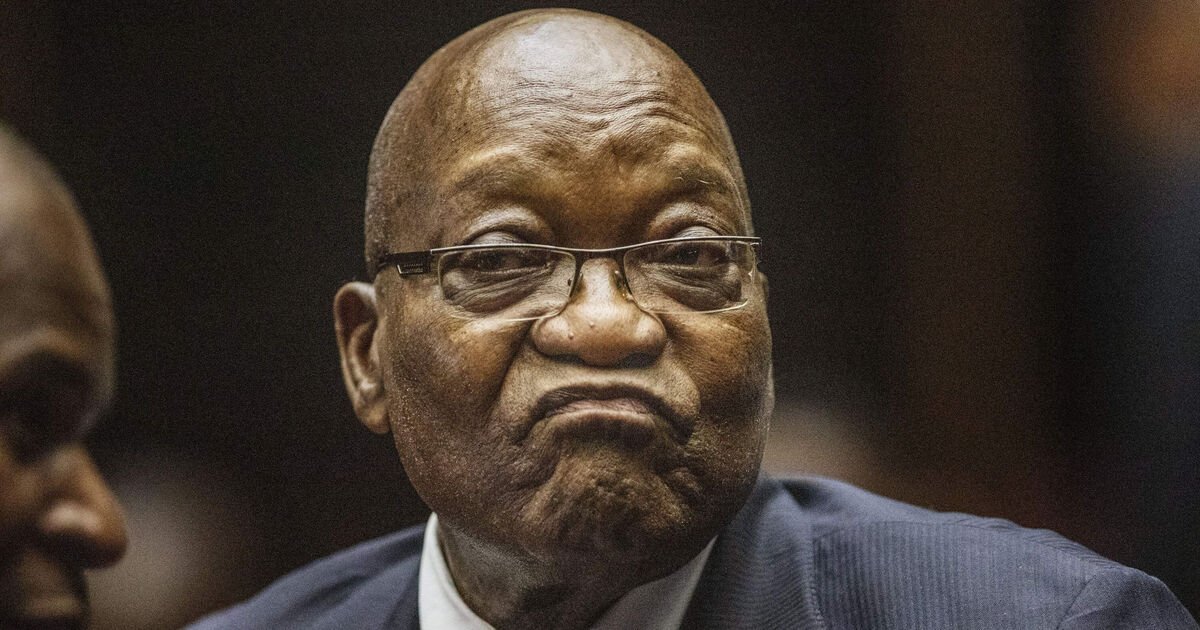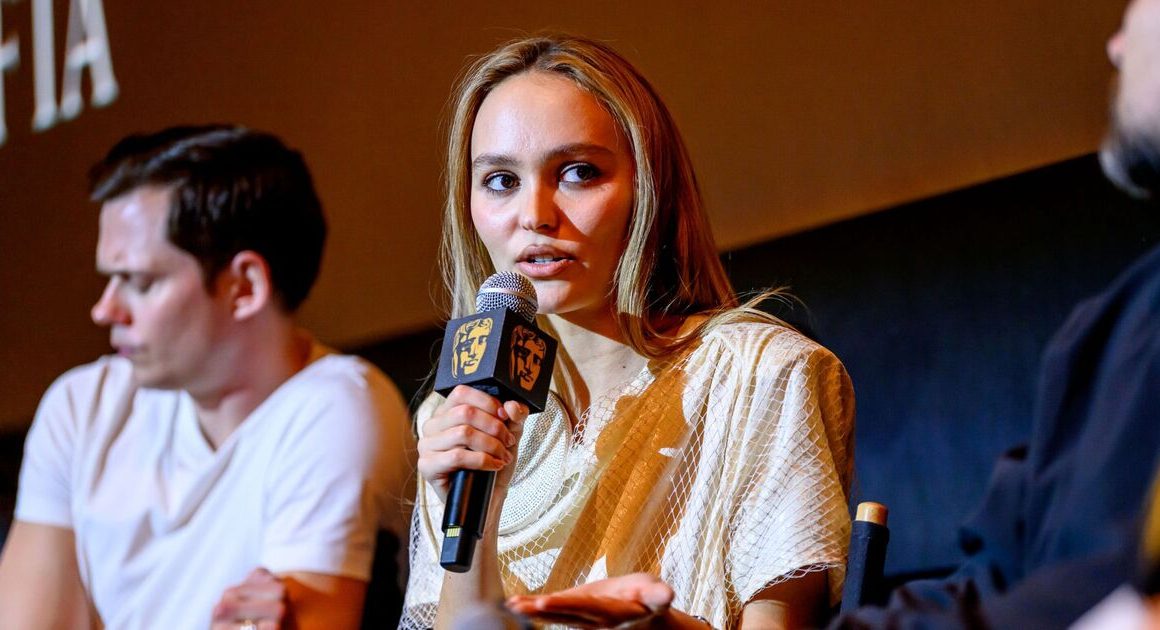
South Africa’s former president Jacob Zuma in court in 2019 on corruption charges (Image: POOL/AFP via Getty Images)
South African thriller writer Deon Meyer’s novels lay bare the endemic corruption during the calamitous rule of the country’s former president. So-called “state capture” – the systematic looting of public institutions – devastated Africa’s most advanced economy during Jacob Zuma’s nine years in power.
Having watched horrified as the president and his corrupt officials, fellow politicians and cronies plundered government coffers at the expense of ordinary people, the Afrikaans author remains palpably angry.
Zuma was forced to resign in February 2018 and Meyer feels a clear responsibility to expose the extent of the kleptocracy. It might seem fitting for a crime writer to examine criminality in the halls of power.
Yet Meyer’s books, featuring world-weary cop Benny Griessel and his devil-may-care partner Vaughn Cupido, are as entertaining as they are thought-provoking, as the pair struggle to police a society bent out of shape by corruption and in near-constant crisis.
“When Zuma became president, he and his cronies had this concerted effort to capture as many state-owned entities as they could, to strip them of assets and steal all the money they could lay their hands on, to enrich themselves,” Meyer, the king of the South African heist thriller, explained over a glass of Stellenbosch red wine during a recent visit to London. “We were doing extremely well post-apartheid and, at first, people didn’t know what was happening.
“He was doing it secretly then, slowly but surely, things started coming out. It was like whack-a-mole, with all the denials of wrongdoing.
“This was a crime against an entire country. That’s the great tragedy of the Zuma years, he didn’t steal from the rich, he stole from the poor; money for projects to uplift disadvantaged communities, to help them to get into agriculture, into business… all that was stolen. It’s heartbreaking.”

Protesters at a nationwide march against corruption in Cape Town, South Africa, in 2015 (Image: Bloomberg via Getty Images)
Airline contracts, railways, logistics, defence, power generation, even the state pension fund – cash was syphoned out of almost every area of public life, with assets handed to cronies and vital infrastructure scuppered by corporate malfeasance.
“Eskom, our state electricity provider, was stripped so badly we went into a constant state of what we called ‘load-shedding’ where they would cut the electricity just to keep the grid going – so the lights were going out all the time,” Meyer explains.
Power generation is a good example, says the 66-year-old writer, because South Africa was exporting electricity to its neighbouring countries before Zuma’s rule.
“Because of the astronomical corruption, a lot of power stations simply weren’t functioning and they were breaking down,” he continues. “And there was no cash, because that was stolen too, so they couldn’t repair them. And if there was a tender for repairs, they would give it to a crony who would channel the money elsewhere.
“Luckily, we got rid of him in the end and that’s the great thing about South Africa: on a civil society level, everybody wants the country to succeed. He was voted out because there were still members of his party who realised that, if he remained in power, South Africa would become the next Zimbabwe within years.”
It’s genuinely eye-opening to hear of criminality on such a scale, and, while today South Africa remains the continent’s most successful economy, many of its institutions were brought to the brink of bankruptcy and beyond – including the police.
Zuma’s ousting six years ago brought inquiries and criminal probes in its wake, but Meyer believes it will take decades for the country to recover.
The shock reverberates to this day in Nelson Mandela’s Rainbow Nation. “Zuma is using the Stalingrad defence of challenging everything,” adds Meyer. “He was in prison for a couple of months and then got out.”
Inevitably, it is the police and justice system that especially captures the former journalist’s interest. “The South African police service they inherited was fully functional with a lot of very experienced, smart detectives, especially senior detectives, very specialised murder and robbery units, serious and violent crime units,” says Meyer.
“They made it so impossible for these policemen to continue working that they started losing all this experience and they never trained new people. The top of the police became corrupted too, a lot of the generals were in cahoots with organised crime.”
This is the environment in which Griessel and Cupido are forced to work, treading a path between competing interests, and never quite sure who they can trust in Meyer’s 15th and latest novel, Leo. As ever, Meyer, who lives in the winemaking town of Stellenbosch in South Africa’s Western Cape province, expertly brings together parallel plotlines, including a daring heist gone wrong. It’s already been described by one critic as the “African Job”, in a nod to the classic Turin-set Michael Caine movie.
Griessel and Cupido are, like their creator, based in Stellenbosch in a “punishment posting” after being transferred from Cape Town’s elite crime-fighters, The Hawks. The horrifying killing of Basie Small, a former soldier and mercenary, sets the hares running.
Meanwhile, a group of his former comrades are plotting to steal a fortune in gold bullion plundered by corrupt politicians. But with recovering alcoholic Griessel and his partner awash in a sea of uncertainty, the heist goes awry. “I try to be honest in that I speak to a lot of cops,” says Meyer. “Over the years, I’ve befriended a lot of police in The Hawks and the Stellenbosch Investigative unit. So I think I understand how all of this impacts them and their jobs.
“I don’t regard myself as a political writer, but police work in South Africa is a political job. It’s a big responsibility and that’s why I try to be as honest as I can, not put into the books my own ideologies or my own way of thinking. I ask myself, ‘How would a man of colour like Vaughan Cupido perceive this? How would a cop like Benny Griessel react?’”

Author Deon Meyer writes in Afrikaans to help preserve the language (Image: Guido Schwarz)
Griessel’s first appearance in 1999’s Dead Before Dying in a walk-on part led to an increasingly well-known and admired series, with Leo now his eighth full appearance.
“I needed a drunken cop to walk in on the protagonist while he was about to get lucky with a girl, because I needed to spoil his fun,” says Meyer. “It was not time for him to get lucky. So I created a character on the fly, not thinking that he’d have any future in any of my books. I named him after my favourite teacher at school’s son, and gave him the appearance of one of my favourite alcoholic cops on what was back then the Murder and Robbery Squad in [Cape Town suburb] Belville South.
“Then he sort of sneaked his way into the book and became a very fascinating character who made things happen. You’re always looking for interesting things to make the story take interesting turns, and he was that character.”
Benny’s first full tale, Devil’s Peak, was brought to the small screen last year in an acclaimed five-episode adaptation of the first book by BBC Studios, starring South African actor Hilton Pelser. Griessel and his creator are often compared to US crime writer Michael Connelly and his own iconic detective, Harry Bosch.
“The funny thing is that we both developed those characters around the same time without knowing the other one was doing the same thing,” explains Meyer.
“Many years ago, I did my first American book tour with Michael Connolly. I’m a great fan. We were together in Scottsdale, Arizona, and I went outside for a cigarette and this man who came up to me thought I was Michael Connelly!”
With their similarly short-cropped, grey hair and goatee beards, the two men do bear a resemblance and are of a similar age. Yet their characters struggle against different demons.

South African actor Hilton Pelser, left, as Benny Griessel in Devil’s Peak (Image: BBC Studios)
While Bosch lives with the murder of his mother when he was a boy, and his “mission” where “everybody counts or nobody counts”, Griessel though similarly driven is an alcoholic whose constant struggle to stay sober informs everything else.
“I had one alcoholic friend who took me to AA meetings with people’s permission,” explains Meyer. “I spoke to a lot of alcoholics, and I really tried to make my books different in terms of looking at alcoholism seriously and that daily battle. The alcoholic cop is a very traditional crime fiction character – he’s been with us since the 1950s – but my idea was never to write a series. I wanted to write only standalone books.
“But then you sort of fall in love with a character like Benny. And then the publisher says they would love a series. And the readers say they want more Benny and you sort of get seduced into that.”
As Meyer explains, Cupido emerged as a counterpoint to the darkness of Griessel over the subsequent novels. “Benny is not an upbeat, funny kind of guy,” he admits. “He was struggling with alcoholism, with the loss of his family, with divorce. You need something to balance that with.
“Vaughn became that foil with a totally different outlook on life. A fun-loving, humorous guy who’s always joking, who isn’t as influenced by the dark work that they do. It was almost instinctively that I knew I had to balance these things.
“All authors write for one reader, that is the one inside of them, and I started realising this darkness is not what I like to read. Reading should be fun.
“Especially if you’re trying to create suspense, humour is often a wonderful way to relieve that suspense for a moment before you take it up a notch.”
Meyer writes in Afrikaans, and the text is then translated into English. “Writing a novel is hard enough in your first language so writing in a second language is even tougher,” he chuckles.
“Afrikaans is not a big language – it’s got about six million speakers worldwide – so it’s my contribution to keeping my mother tongue alive. When I started writing crime fiction, there was no crime fiction in Afrikaans.”
Is he optimistic about the future of his country, I wonder?
“I think things have never been as bad as we feared. And things have never been as good as we had hoped. We’re doing a lot of the right things now, but there are still a lot of wrongs being done, a lot of bad political decisions being made. We don’t have great politicians, but that’s a universal problem.
“One of the big battles of being a South African crime author is that, especially in the UK, readers think it’s going to be dark, very violent and not entertaining. It’s not true. Despite everything, this book is light-hearted, fun, humorous and entertaining.”
• Leo by Deon Meyer (Hodder, £22) is out now. Visit expressbookshop.com or call Express Bookshop on 020 3176 3832. Free UK P&P on orders over £25

Leo is Deon Meyer’s eighth Benny Griessel novel (Image: Hodder)












